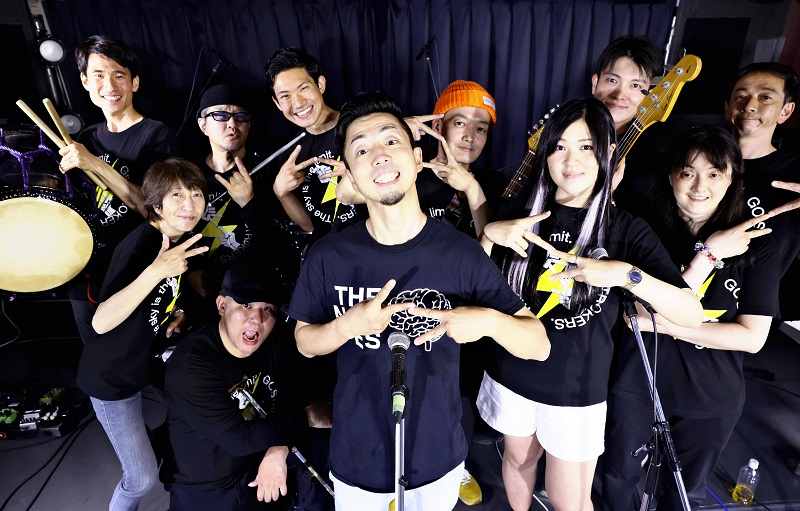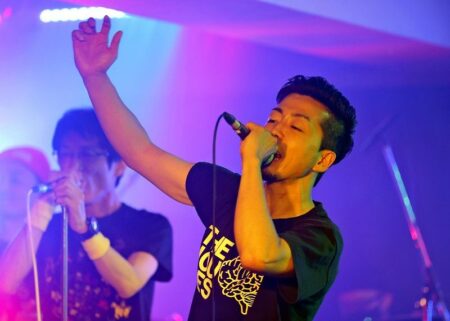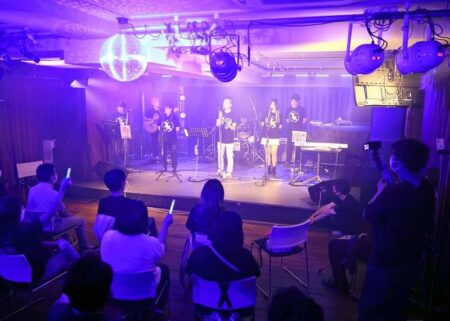Stroke survivor holds festival to bring hope

Junya Kobayashi, center, poses with other participants of the Nosocchu Festival in Shinjuku Ward, Tokyo.
12:15 JST, August 19, 2022
Junya Kobayashi, 39, suffered a stroke during his 20s and subsequently became a physiotherapist. He now organizes an annual event for people who have had a stroke and those who are able-bodied to enjoy sports, music and other activities together.
Kobayashi hopes the event — the Nosocchu Festival (Cerebral stroke festival), nicknamed Noufes — will help both groups of people to take a new step forward. He strongly believes that even if you have had a stroke, you still have infinite potential. And supported by friends and colleagues, he continues to run farther and farther onward lit by the fire of this belief.
“You can do anything you want to even if you have had a stroke!”
On June 3, he shouted this from the stage of a club in Tokyo, and the crowd’s excitement roared to its peak.

Kobayashi sings at the Nosocchu Festival.
This was during a concert by the Strokers. Some of the band’s 11 members, including the vocalist, the drummer and a dancer, are past stroke sufferers. They all met through the Nosocchu Festival.
Under the motto, “Fun for all!” the festival was first held in October 2017. So far it has taken place twice with a live audience and twice remotely. The event has become an opportunity for participants to form groups for activities such as sports, music and cooking. The Strokers is one such group.
“Some people suffering from the aftereffects of a stroke withdraw from the world. That’s why I want to create an opportunity for them to get in touch with people and society,” Kobayashi said.
Kobayashi was born in 1982 in Fukuoka Prefecture. He was 23 and an aspiring boxer when he had a cerebral stroke while shadow boxing in a gym. He survived but was left paralyzed on the right side of his body. At first, he could not move his limbs freely and even found it difficult to get up from bed.
Still, he continued with rehabilitation, insisting he would become a pro and get better than he was before the stroke. In less than four years, he improved to the point that he was able to resume boxing, but was unable to obtain permission from his doctor to take the test to become a professional.
Kobayashi sought a new dream and happened across a path to becoming a physiotherapist.
“I still had light paralysis in my right hand. That’s why I thought I’d be able to become a physiotherapist who could relate most closely to patients,” he said.
He obtained a physiotherapist’s license when he was 30, and became involved in the rehabilitation of cerebral stroke sufferers at a hospital in Chiba Prefecture. During the course, he realized that there was a psychological gap between the patients and able-bodied people.
Patients, who are suddenly deprived of the ability to move and control their bodies, become pessimistic about themselves, thinking they are different from able-bodied people. At the same time, even medical workers helping them with treatment and rehabilitation find it difficult to be aware of such feelings.
Kobayashi thought there was a gap because these two groups didn’t know each other. If they had a fun experience together, they would be able to understand each other.
When he posted his plan to host a festival on social media, about 40 people from across the country gathered for the project. These collaborators included former patients who had been rehabilitated as well as medical workers.
Infinite potential
During a fashion show at one of the festivals, a woman in a wheelchair saw the red carpet on the runway and suddenly stood up and started walking, aided by a helper. After the festival, she changed her attitude toward rehabilitation and eventually became able to walk on her own again.
“Your experience at the festival takes you to the next step. Even if you have had a stroke, your potential is infinite,” said Kobayashi, expressing his conviction born from seeing people like this woman many times before.
He relays information about the festival on his YouTube channel, too, and the event is becoming better known among stroke sufferers and their families.

Kobayashi, stage center, performs at the festival.
Now he is busy preparing for the festival this autumn. In the past two years, the event was held remotely due to the novel coronavirus pandemic, so this year is to be the first event with an in-person audience in three years.
“The Noufes is about sowing seeds of potential. I’d like to create many kinds of opportunities for people to realize their potential while having a good laugh with each other.”
A more accepting society
Below are excerpts from an interview with Kobayashi.
Q: What has been the most exciting moment in your life?
A: When the door of an elevator I was in opened onto the floor of a gym, around the time I started aiming to become a professional boxer.
Q: Do you have any special skills?
A: As an emcee for events, I can create positive vibes through intuition and ad-libbing. I drove the audience into a huge fit of laughter at an event for the film “First Mission” [2022], for which I was involved in the planning.
Q: What is your ideal society?
A: I hope society will be a place where people can accept the fact that each person is different, like a gradation of colors, where people are not clearly labeled as a disabled person or an able-bodied person. With that wish in mind, I published the picture book “Tagusuke” in December last year. It’s about a boy who attaches tags [prejudice and biases] to people before learning about the world and beginning to remove the tags.



